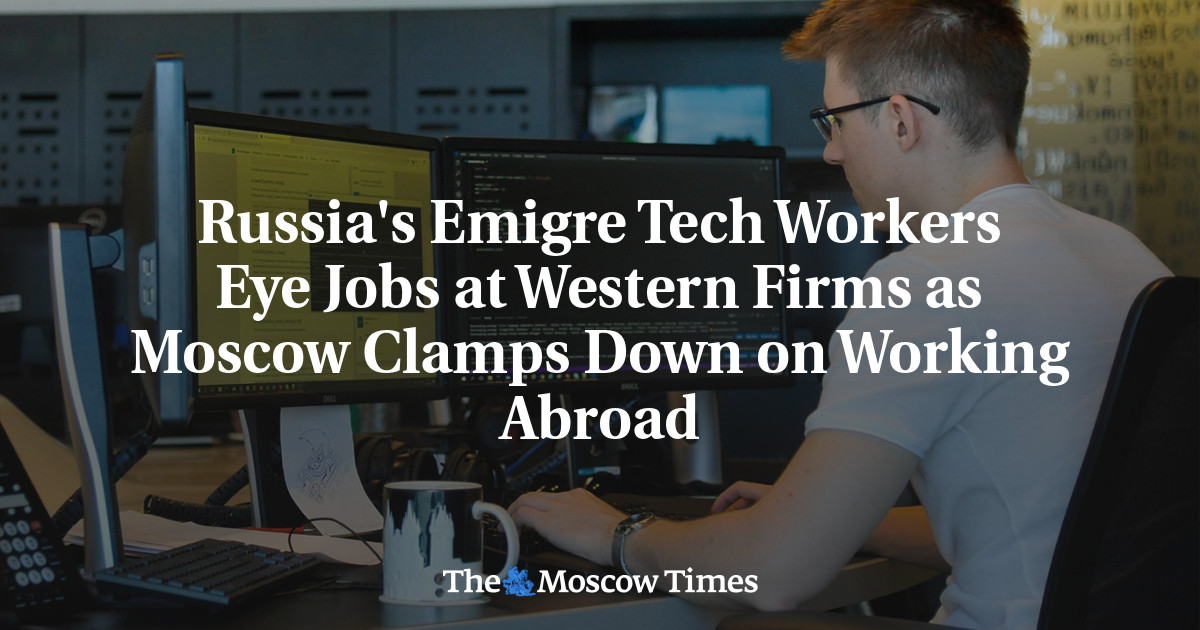


Russian IT specialists based abroad are increasingly eyeing jobs at Western IT companies amid growing worries that their days of being permitted to work remotely for Russian firms are numbered.
Western tech startups and firms, meanwhile, appear to be interested in capitalizing on this highly skilled and less costly workforce, actively recruiting Russian tech workers based outside the country.
Russia’s vibrant IT sector has been one of the country’s hardest-hit industries since the invasion of Ukraine. It’s estimated that between 700,000 to 1.5 million tech workers left Russia after February 2022 out of opposition to the war, fear of being mobilized or economic concerns.
Many of these professionals are now regularly sent messages on Linkedin from IT recruiters or tech companies based in Europe, Britain and the United States, several of them told The Moscow Times.
“Oftentimes they ask for a general chat to gauge my interest, but I’ve also had full job interviews,” said Sergei, a data engineer living in Serbia.
Sergei said he has been approached by IT recruiters offering both full relocation and remote work. Startups, second-stage startups and gaming companies such as Space Ape in London also sought him out. Some of these recruiters have been from European or U.S.-based Russian companies like Nitka or Luxoft, which also relocated abroad when the war started.
“I match the skills needed, but the main thing is to prove my level of English,” said Sergei, who asked that his surname not be shared due to worries of repercussions from his employer or the Russian government.
Sergei still works for a Russian company, as do most of the Russian tech diaspora, which now numbers in the hundreds of thousands. These specialists work remotely while living in countries like Armenia, Georgia, Kazakhstan and Serbia.
Russian officials have sought to lure these IT-shniki (a Russian term for IT workers) back.
But none of Moscow’s discussions on “reverse relocation” initiatives have yet materialized into concrete measures. Digital Development Minister Maksut Shadayev claimed these measures were unnecessary because emigres were already returning on their own.
Many IT specialists who fled after the invasion have indeed returned to Russia, faced with financial strain abroad or lured by the exemption from military service for tech workers and the prospect of a stable life at home. Still, it’s estimated that over half of those who left since February 2022 remain abroad.
For those now looking to relocate further West, a host of IT recruitment firms has been offering specialized services for companies hiring Russians, including EU-based Scede, Lucky Hunters and Recruiter.com.
“Russian IT specialists are still desirable personnel for Western companies despite the geopolitical situation,” Fyodor Chemashkin, technical director of Yakov and Partners consulting firm, told the Kommersant business daily.
Forums offer advice on securing visas and paying remote workers. They also compile statistics that state things like “developers in Russia are ranked second in HackerRank’s list of the best developers in the world.”
George Rowberry from MODE, a recruitment partner to startups and SMEs in Germany and the U.K., has been hiring Russian, Ukrainian and eastern European IT workers since 2017. He said he has seen a spike in candidates from these countries since the war began.
“The war has created motivation for people to leave those areas even more so than before,” Rowberry said. “Often these people who are going through pretty awful times outside of their work really want the job and they do well in interview processes.”
“These candidates are really good because the level of technical universities in those countries tends to be really high, and the level of English is generally good among those working in the tech sector.”
Western European IT workers in comparison are “more in demand and more costly. So we offer some candidates from Russia or elsewhere who a company can relocate,” he said.
Rowberry’s team finds candidates through Linkedin, searching for their “stack,” or specific set of skills. Many Russians display an #opentowork tag on their LinkedIn profile photo, he said.
MODE also keeps an eye on developments in Russia and Ukraine. For instance, the recent $5.2 billion takeover of Yandex’s Russian assets by a consortium of investors believed to be close to the Kremlin has worried some remote Yandex employees as the company restructures and reallocates its spending.
In February 2023, lawmakers passed legislation that would prohibit employees of IT companies that work for the government or handle sensitive state information from working remotely. The law does not state how it will trace or penalize those who’ve remained abroad.

State Duma Speaker Vyacheslav Volodin in December 2022 called for higher taxation for Russians who have moved abroad.
A Serbia-based data engineer from Russia who spoke on condition of anonymity recently moved from Yandex’s Serbian office to Microsoft’s Belgrade headquarters. He said he received requests from his former Yandex colleagues for more information about making a similar move.
“We would obviously go and target those companies because those people tend to be more likely to be able to move,” Rowberry said.
MODE said it has seen a significant increase in candidates keen to talk about moving to Western companies, but that this hasn’t yet translated into an exodus into new jobs.
“At this stage, it seems people are gauging interest,” said Rowberry.
Salary concerns are often cited as the reason why Russian tech workers stay in their current jobs.
Yevgeny, who works for a Russian IT company from Kazakhstan, was approached by U.K. and Estonian tech companies.
“Neither offered anything new; it was the same position, salary and projects. The only benefit was relocation,” he said.
He ultimately chose to stay in Kazakhstan and continue working for his Russian employer.
“The salaries Western companies offer are no higher than Russian companies,” said Alexei, who is based in Georgia.
“In Georgia, I can live very well on my salary. But if I have to relocate to Europe, my salary won’t go as far. Stable countries are expensive.”
Sergei in Serbia said he fears Russia’s tolerance for remote tech workers will soon run out. Though he is keen to find a job at a Western company, he said he becomes annoyed when recruiters offer him a lower starting salary.
“Is it because I’m Russian?” he asked rhetorically.
These professionals may soon find themselves in an oversaturated job market as more Russian IT workers seek to move to Western Europe.
Demand for EU residence permits among Russia-based IT specialists surged by 233% in the first quarter of 2024 compared with the same period of 2023, the Kommersant business daily reported Friday.
Danya, who already lives in Germany, said that although he’s been inundated with messages on Linkedin, he has so far found it challenging to actually secure a job.
“There’s a hot pursuit for tech jobs right now,” he said. “On LinkedIn, there will already be 100 applications for a job just one hour after it’s posted. I had to register for alerts on the career sites of all the companies I wanted [to work for] so I could be among the first applicants. I set a loud alert on my phone. Only after I switched to that strategy did I finally start getting interviews.”
As you may have heard, The Moscow Times, an independent news source for over 30 years, has been unjustly branded as a “foreign agent” by the Russian government. This blatant attempt to silence our voice is a direct assault on the integrity of journalism and the values we hold dear.
We, the journalists of The Moscow Times, refuse to be silenced. Our commitment to providing accurate and unbiased reporting on Russia remains unshaken. But we need your help to continue our critical mission.
It’s quick to set up, and you can be confident that you’re making a significant impact every month by supporting open, independent journalism. Thank you.